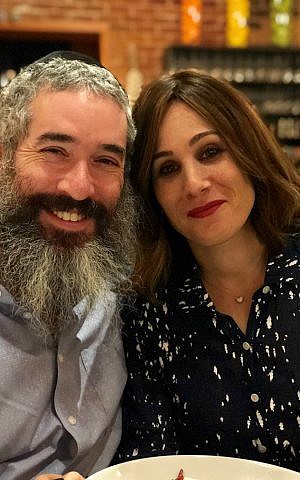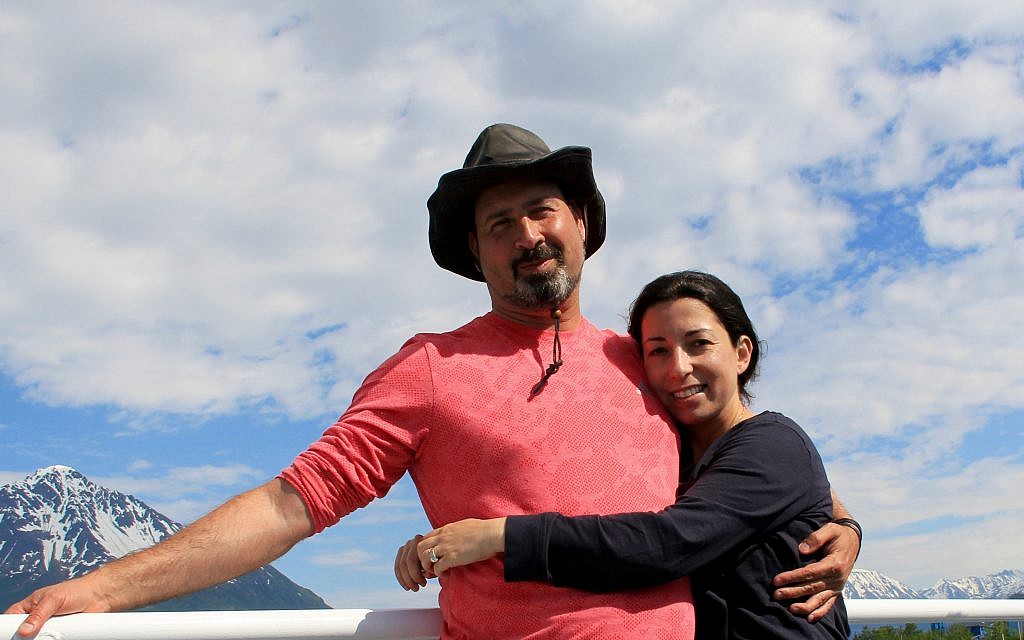Spiritual Leaders on Relationships
Religious leader powerhouse couples explain what helps some relationships endure the test of time.
Relationships may not always be easy, but what keeps some from falling apart could be shared values, mutual respect and commitment from each partner to work together through difficult times.
To learn more about what helps some relationships endure the test of time the AJT spoke with a cross-section of religious leader powerhouse couples: Congregation Or Hadash Rabbis Analia Bortz and Mario Karpuj; Temple Emanu-El Rabbi Spike and Marita Anderson; and Chabad Intown Rabbi Eliyahu and Dena Schusterman.
The AJT interviewed each couple to better understand what keeps their relationship strong, how their Judaism plays a role, and what advice they have for young adults just starting their relationships or actively looking for their partner.
Get The AJT Newsletter by email and never miss our top stories Free Sign Up

Loving a Rabbi
Bortz first met Karpuj in Buenos Aires after her Jewish high school hosted his. She was 14; he was 15. The couple now have two daughters: Tamar, 27, and Adina, 22, and have managed to keep their relationship strong for almost 29 years.
Support for one another is one of many elements Rabbi Bortz said helps keep their relationship strong. “Relationships are based on mutual respect, good communication and the ability to face conflict resolutions. Our relationship’s foundation, which started when we were 14 and 15 years old, is based on shared values and has been strong because our motive in life is to make each other happy,” she said.
Married for 15 years, the Andersons tied the knot when Spike was 30 and Marita was 24. The couple first met in New York City and now live in Sandy Springs with their three children.

Marita says communication is part of what keeps her marriage strong. “I think early on we realized and made a commitment to move toward a place where we trusted where the other person is coming from, and to give each other the benefit of the doubt, that whatever is going on, it is coming from a place of goodwill, love and care, and that we each have hard moments,” she said. “It’s a daily dance and we step on each other’s foot, but we just keep on moving.”
When Eliyahu and Dena Schusterman formally met as a shidduch, she was 19 and he was 21. Their families were both connected as Chabad families in Crown Heights, Brooklyn and later as shluchim in California. Married for 23 years now, the couple lives in Virginia Highland with their eight kids.
“What keeps our relationship strong is hard work, commitment, love, passion, collaboration, having similar values and goals. But all of that aside, we work hard on communicating, sharing and making time for each other,” Dena said. Her husband added, “Relationships are made of two individuals, and when the parties work on something that is bigger than themselves such as marriage, values and children, that’s what keeps a marriage strong.”
The Jewish Marriage
Each couple expanded on how Judaism plays a role in their relationship. “Judaism is the cradle of our relationship. Similar upbringing, love for our traditions and love for Israel are strong values which we have raised our family on and based the pillars of our kehillah kedoshah,” Bortz said.
Rabbi Anderson shared those sentiments: “Judaism is superb at creating or exposing moments of quiet holiness that can happen in a family and, because we live such a vibrant Jewish life and have lots of these opportunities, we take advantage of them.”
Dena Schusterman added, “Our whole outlook on life is through that lens, all those Jewish values, such as kindness, sharing and caring, … but what Judaism allows, in a healthy and safe way, is to be your own person, because even if you are married, you still need your own privacy and to be your own person allows for that self-actualization.”
Rabbi Schusterman further explained, “Judaism allows you to be holy and wholly. There is nothing in life that we can do without divine existence, and there is probably nothing more complex than a male and female relationship and marriage. But being committed and understanding that there is something bigger than the two of us, that we need to lean on, derive strength from and remain anchored, is a key ingredient.”

Lessons Learned
The couples also shared some things they have learned along the way in their marriages. The Andersons, for example, have discovered how to fight fair and reconcile. “I think one of the things we learned early on is that you don’t cut down the trees, meaning there are certain things we never say to each other. We don’t fight to hurt. We might have an argument to prove a point or to blow off steam, but not to wound,” Marita said.
Not giving up on the other person is another trait Rabbi Schusterman said he has learned from marriage. “Life has its own journeys and we sometimes get so stuck in what we are experiencing right now that we don’t zoom the camera out. I think that is a tragedy because so many relationships are broken in that narrow space, and what happens is people give up. But you have to zoom out and say there is a bigger picture here. Let’s give it time, and you have to work on it because there is no shortcut.”
Millennial Advice
In terms of relationship advice for millennials, Rabbi Anderson says the younger generation should take their time and make sure the person they are with is the person they want to wake up next to for the rest of their life. “If you can’t envision going through all the amazing things that life has to offer and the decades, even when you are old, then they are not the right person,” he said.
“The biggest mistake I see in some millennials that I interact with today, is that they are in relationships that they know are not going anywhere, which is sometimes okay if you are not ready to go somewhere, but there is no emotional space for that right person to come along if you are in a relationship with someone who is not right for you. I think that’s what causes a lot of suffering.”
Rabbi Shusterman added, “It’s not about dropping your expectations, but having expectations of who you want to meet and has to include things that are of long-term value. People today are looking for a lot of superficial things and get disappointed when they don’t find what they are looking for or things that are not necessarily real. The real things are deep, and if people look for those things, they will see that they are out there, and those are the things that will ultimately make a relationship last.”
Dena said, “The goal is to have someone who shares your ultimate values…and having a person before marriage to turn to in a respectful way. …It’s like having a mentor , someone who is older than you, someone who has been through life before you, and meeting and talking to people who have had successful marriages and help you bring awareness about what brings longevity to a marriage.”
The Schustermans also advise millennials to get out of their own heads to really consider the other person’s position and to also make time for one another. “You have to spend time together, alone, out of your space, out of the routine … you have to invest in your relationships.”





comments